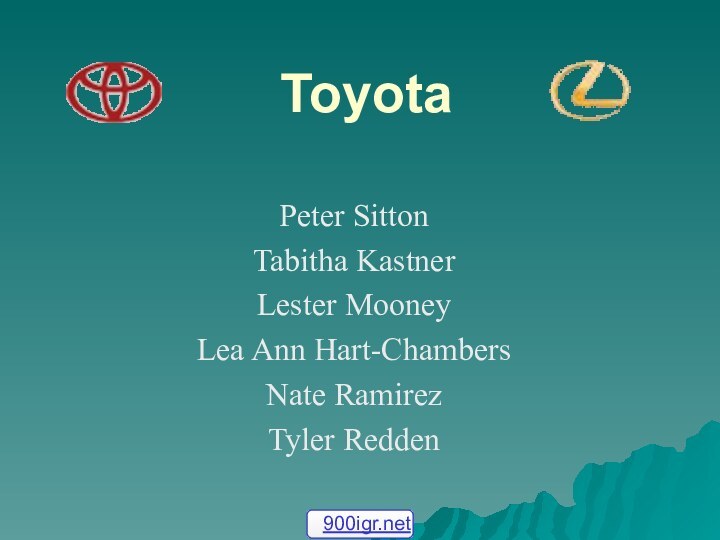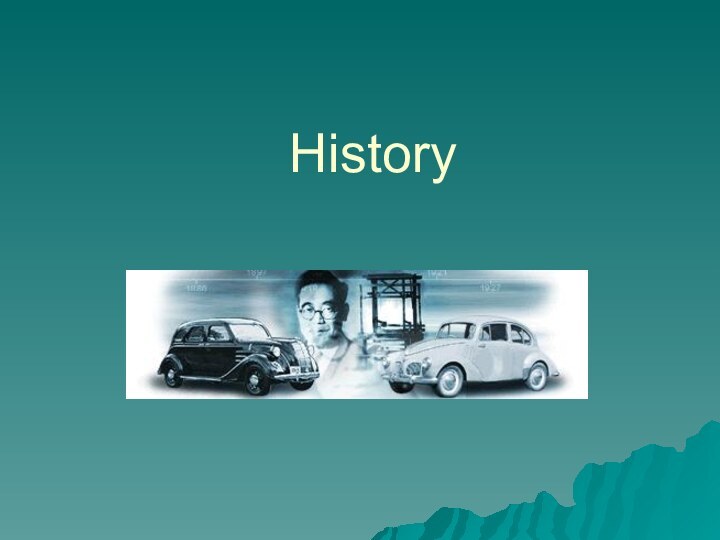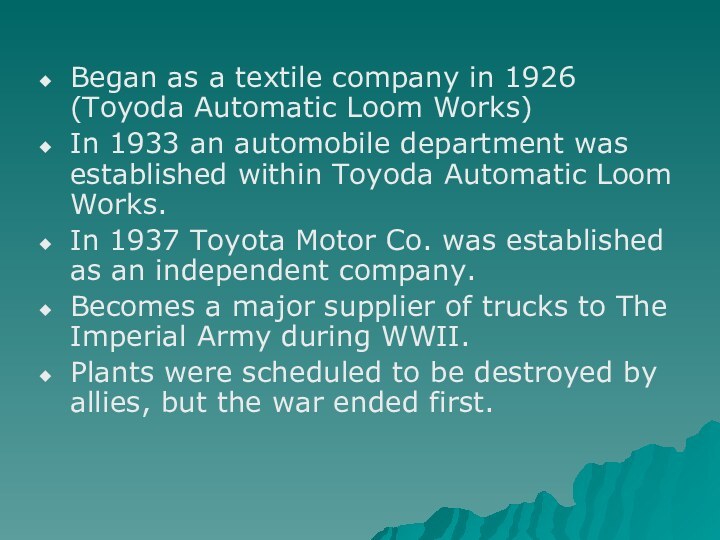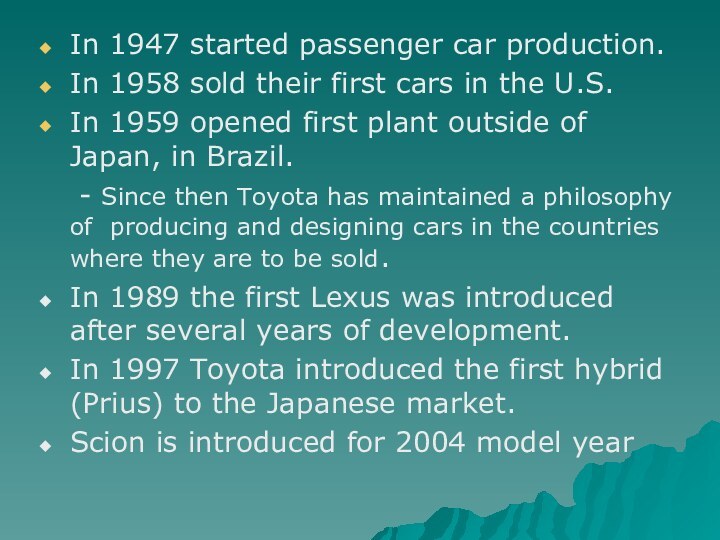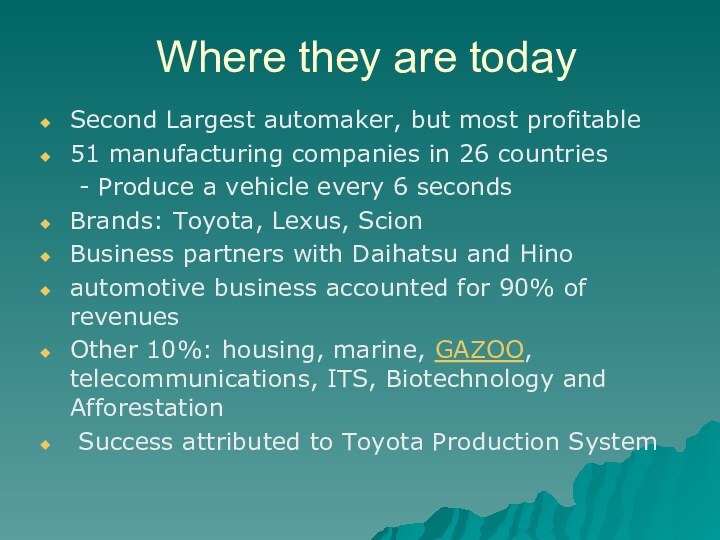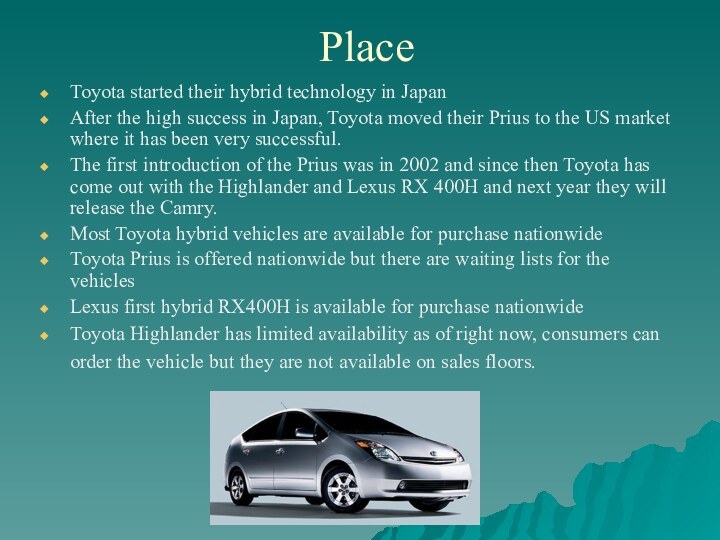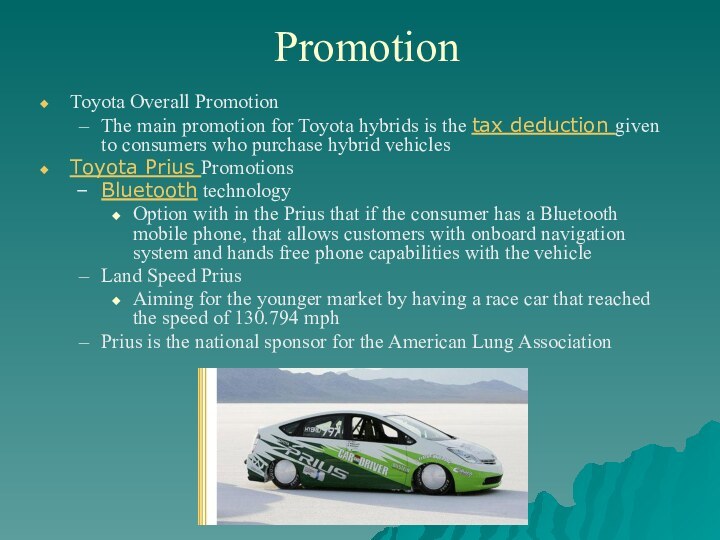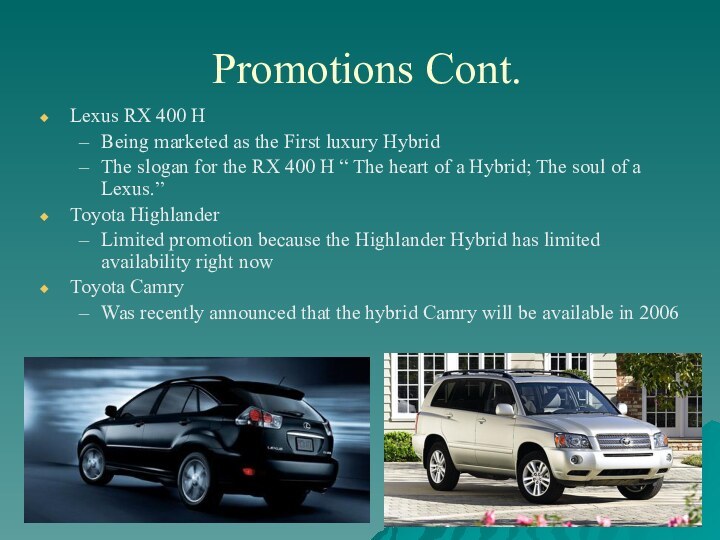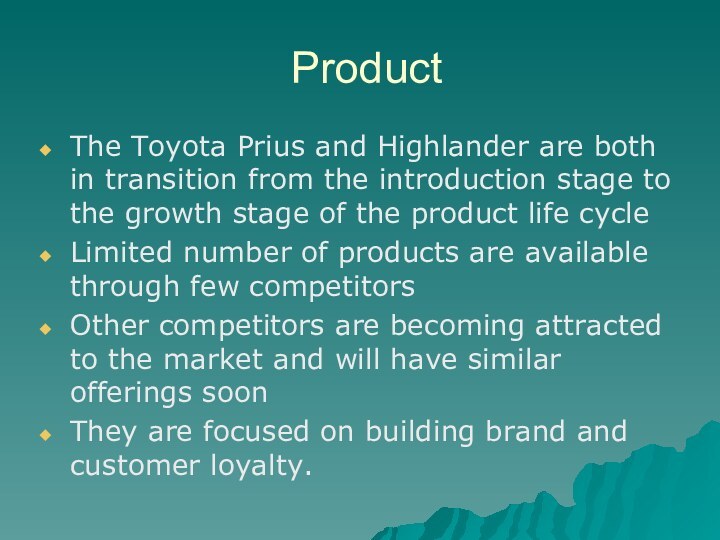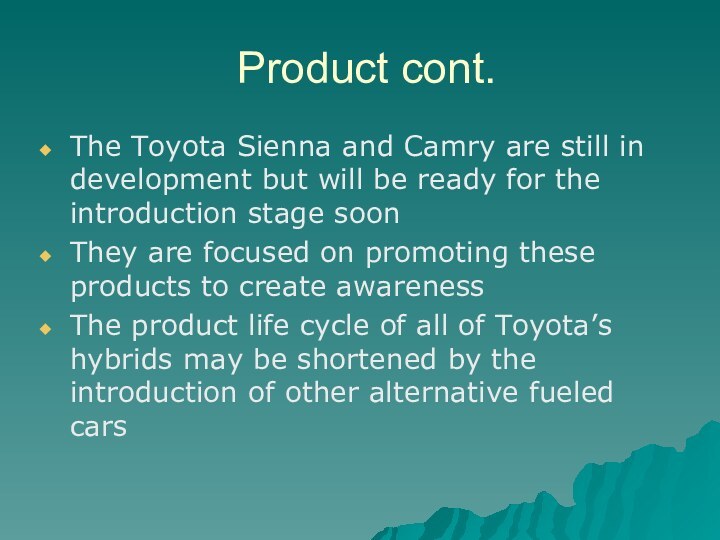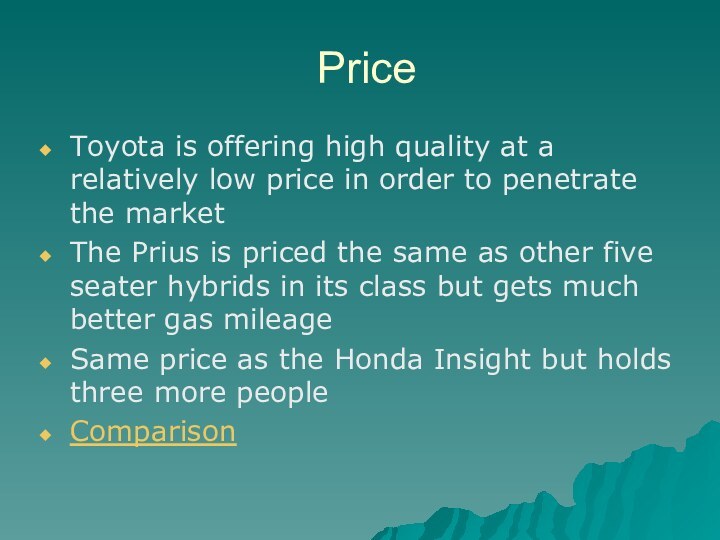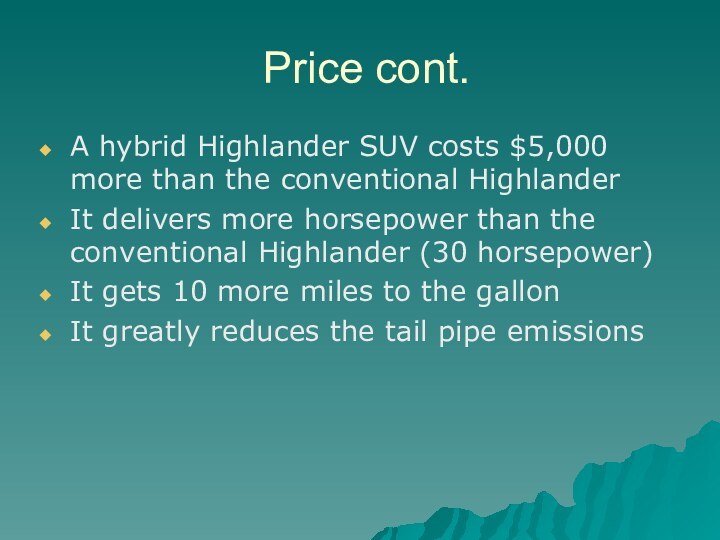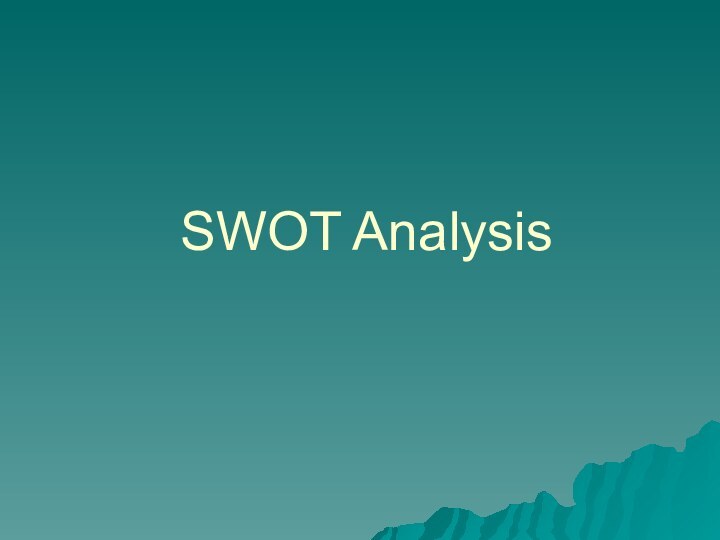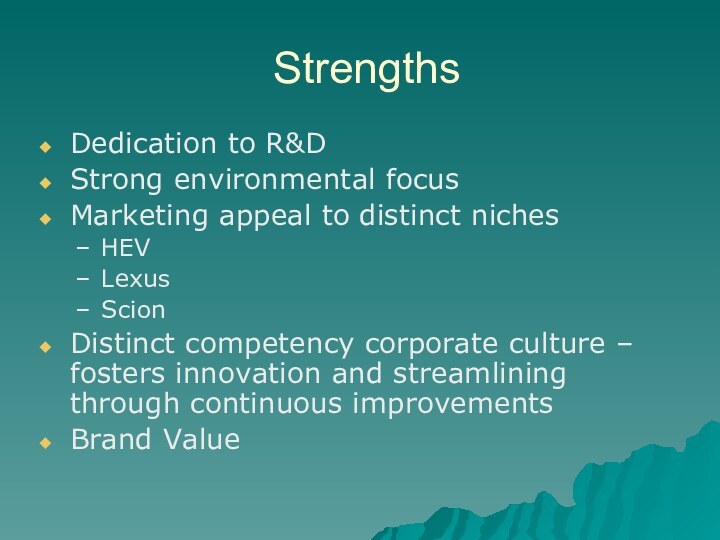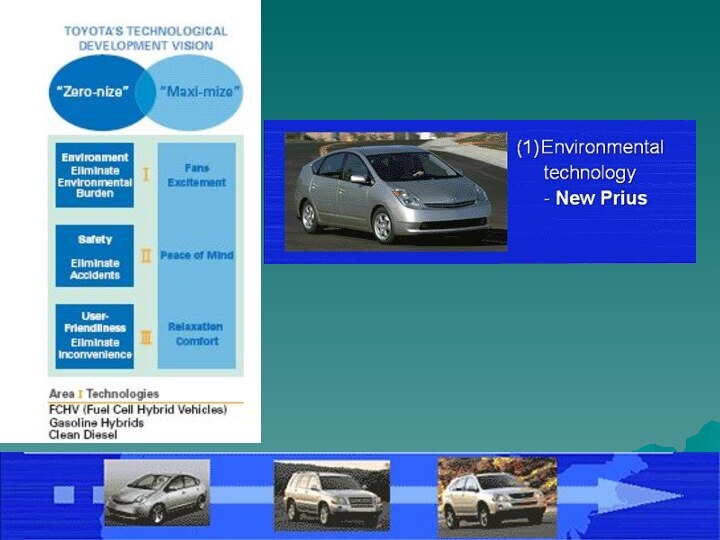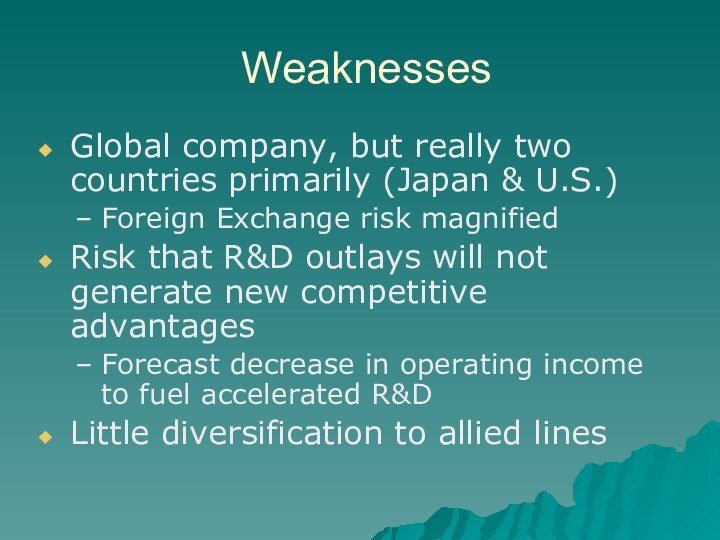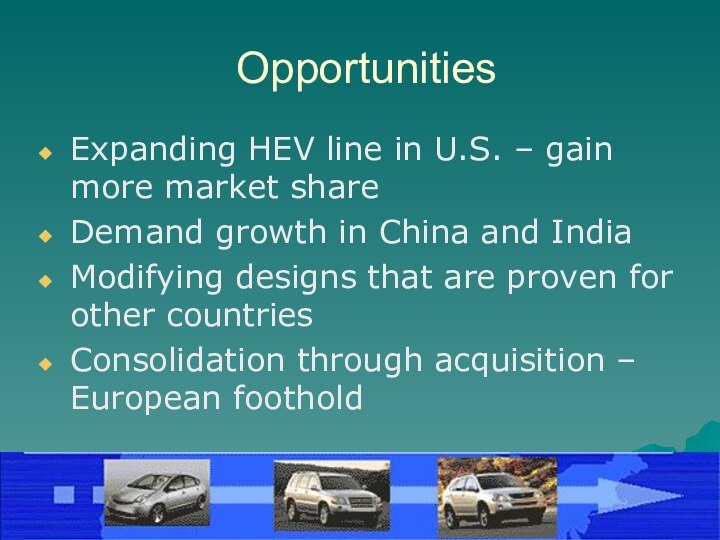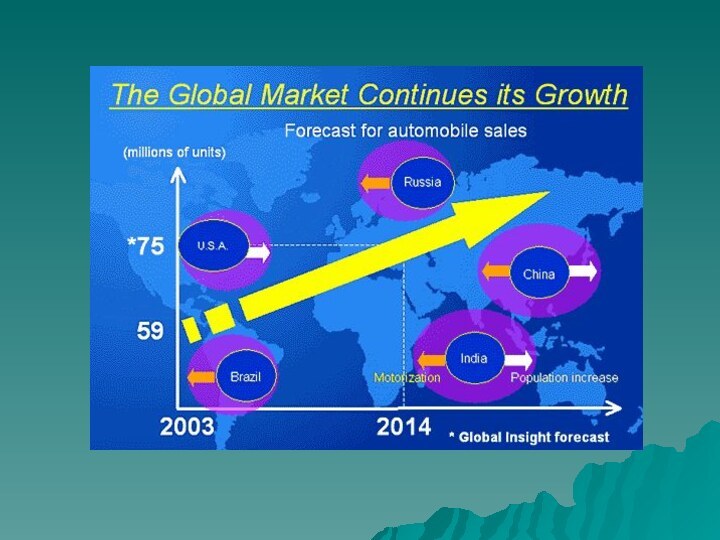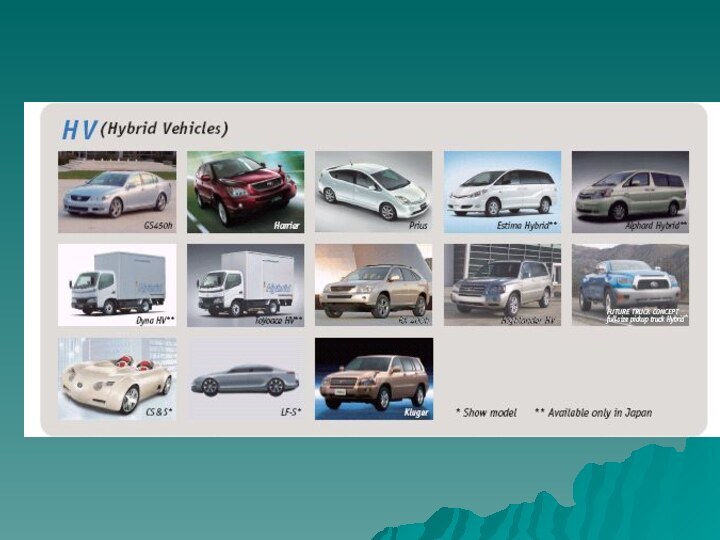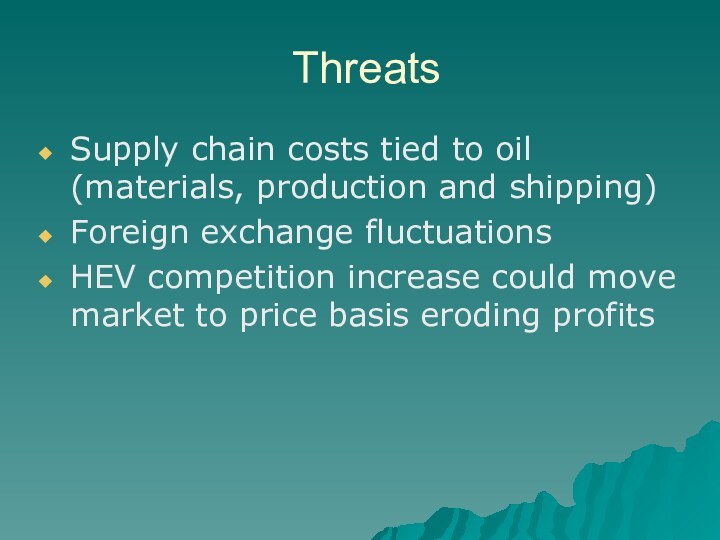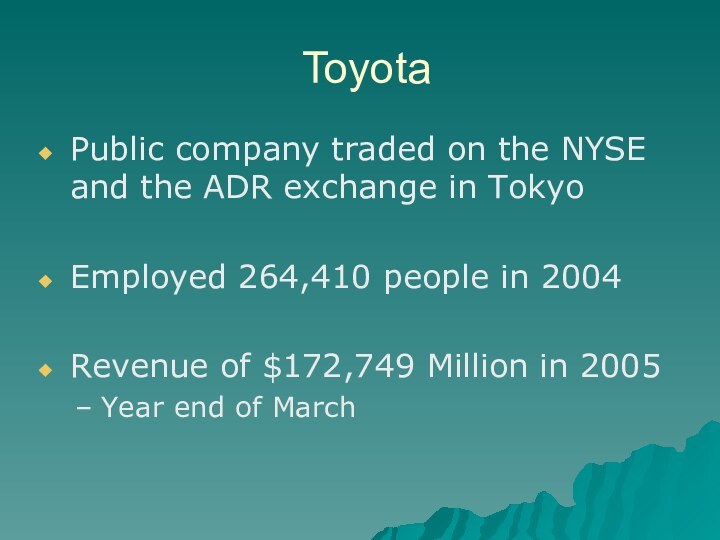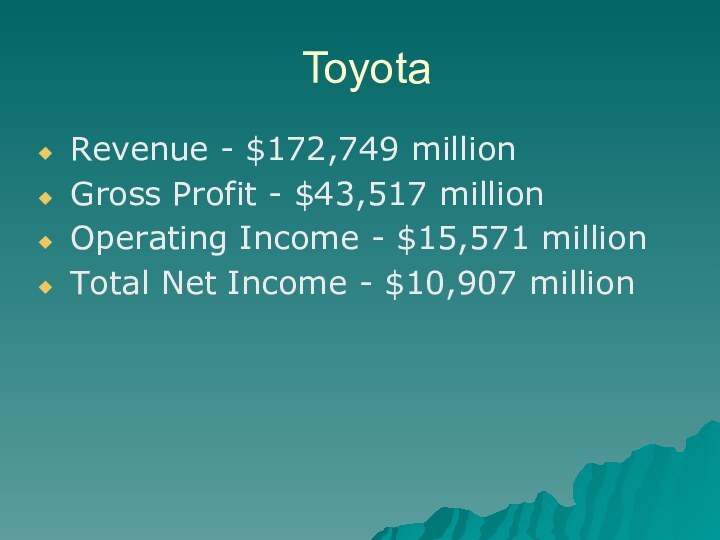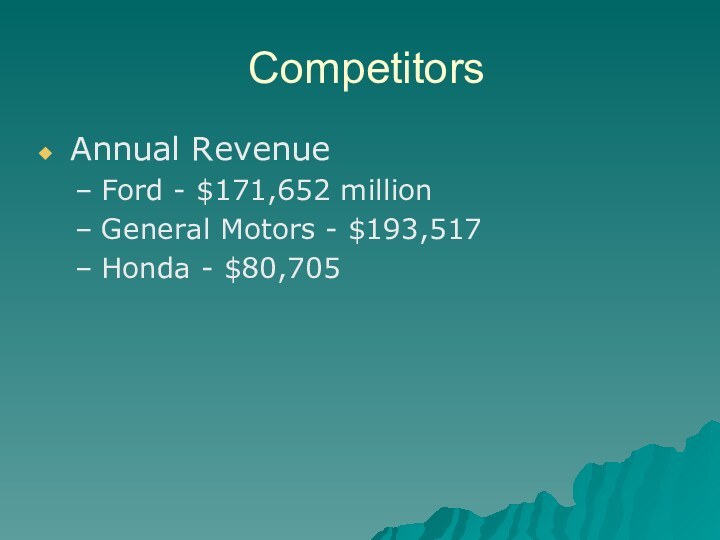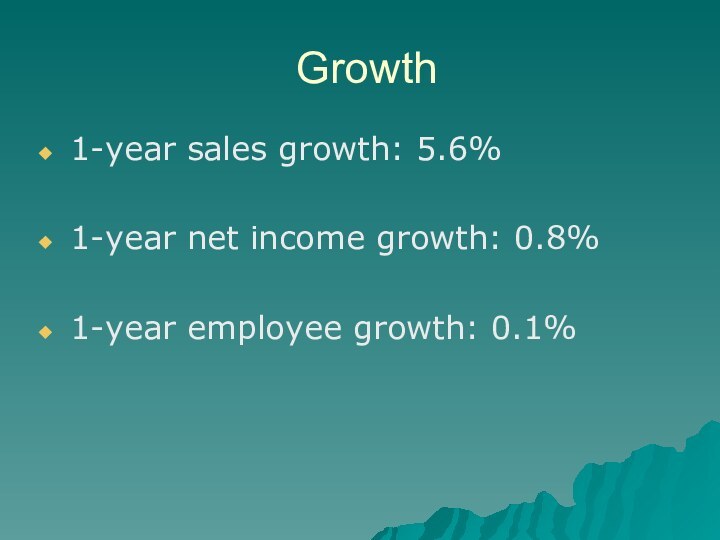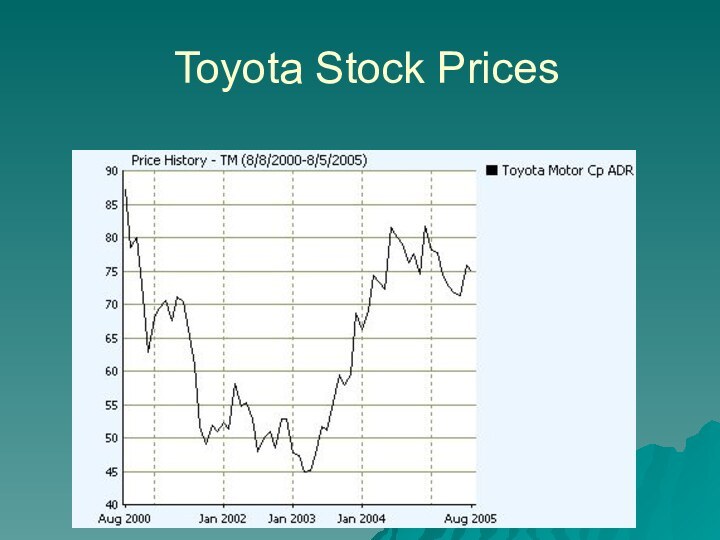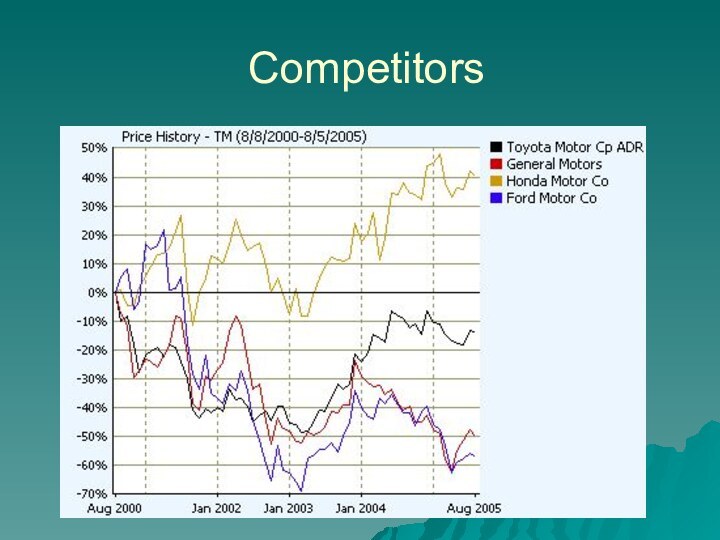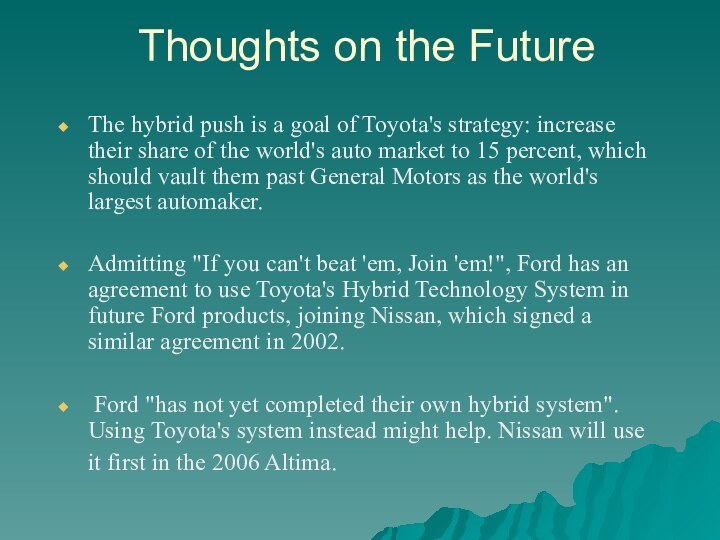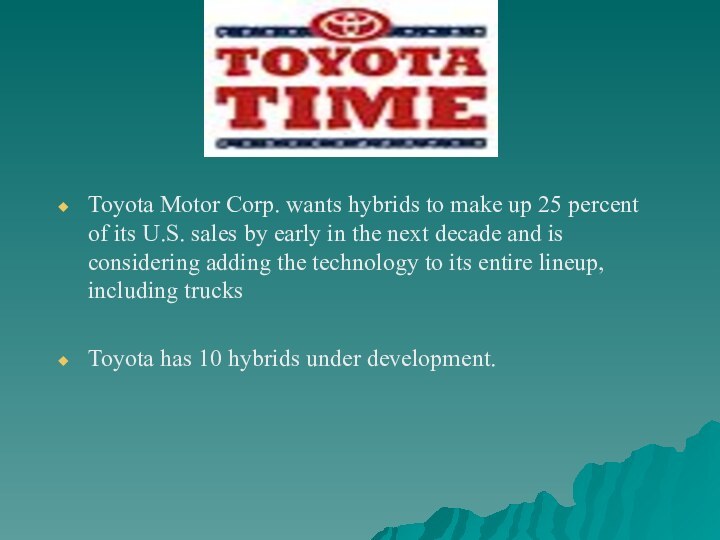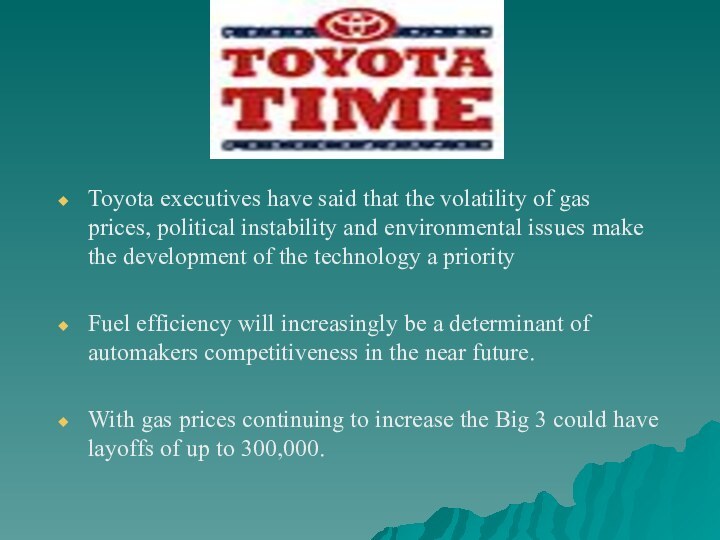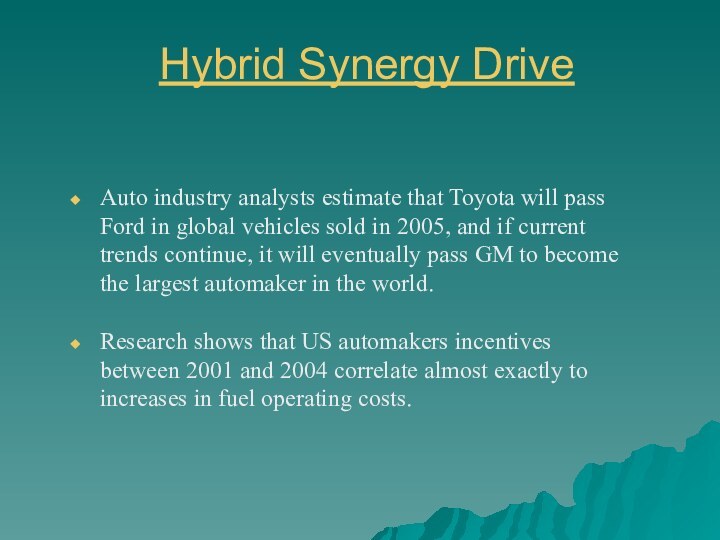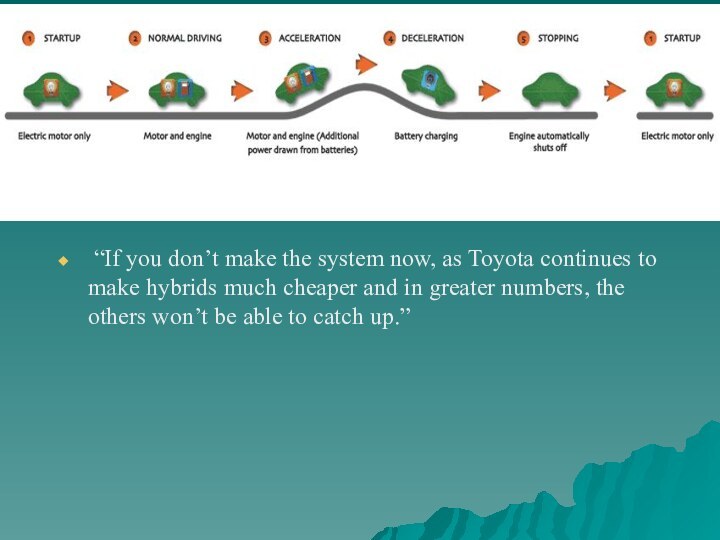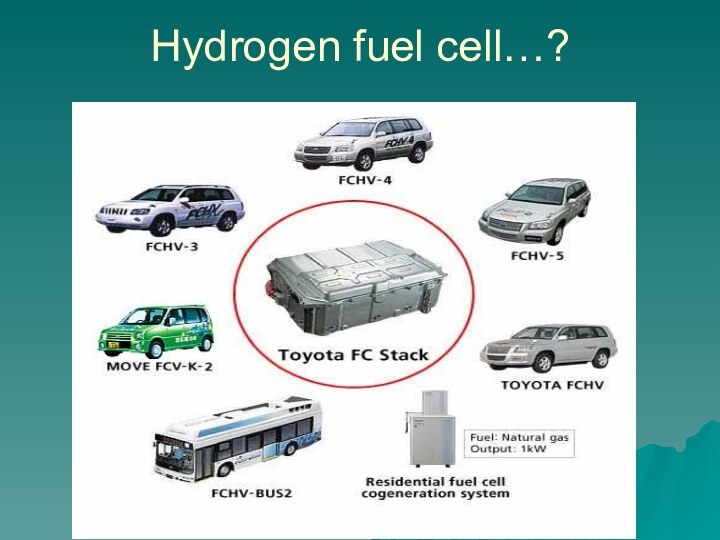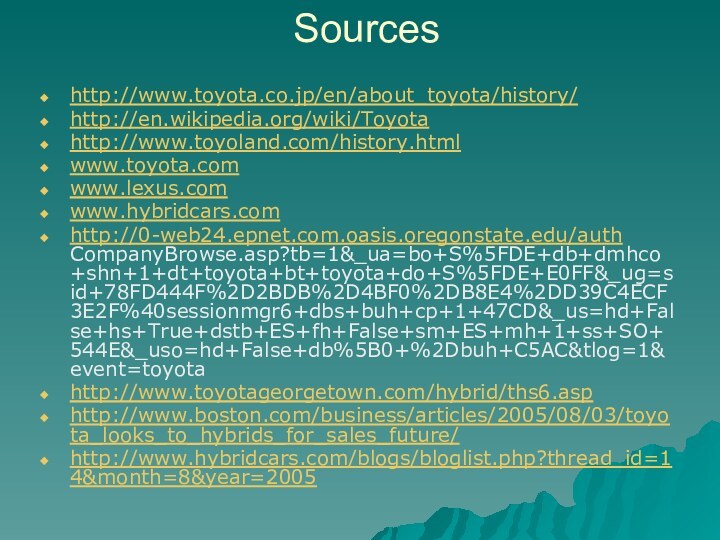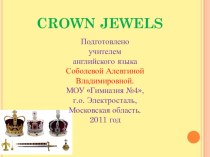Слайд 3
Began as a textile company in 1926 (Toyoda
Automatic Loom Works)
In 1933 an automobile department was established
within Toyoda Automatic Loom Works.
In 1937 Toyota Motor Co. was established as an independent company.
Becomes a major supplier of trucks to The Imperial Army during WWII.
Plants were scheduled to be destroyed by allies, but the war ended first.
Слайд 4
In 1947 started passenger car production.
In 1958 sold
their first cars in the U.S.
In 1959 opened first
plant outside of Japan, in Brazil.
- Since then Toyota has maintained a philosophy of producing and designing cars in the countries where they are to be sold.
In 1989 the first Lexus was introduced after several years of development.
In 1997 Toyota introduced the first hybrid (Prius) to the Japanese market.
Scion is introduced for 2004 model year
Слайд 5
Where they are today
Second Largest automaker, but most
profitable
51 manufacturing companies in 26 countries
- Produce a vehicle
every 6 seconds
Brands: Toyota, Lexus, Scion
Business partners with Daihatsu and Hino
automotive business accounted for 90% of revenues
Other 10%: housing, marine, GAZOO, telecommunications, ITS, Biotechnology and Afforestation
Success attributed to Toyota Production System
Слайд 7
Place
Toyota started their hybrid technology in Japan
After the
high success in Japan, Toyota moved their Prius to
the US market where it has been very successful.
The first introduction of the Prius was in 2002 and since then Toyota has come out with the Highlander and Lexus RX 400H and next year they will release the Camry.
Most Toyota hybrid vehicles are available for purchase nationwide
Toyota Prius is offered nationwide but there are waiting lists for the vehicles
Lexus first hybrid RX400H is available for purchase nationwide
Toyota Highlander has limited availability as of right now, consumers can order the vehicle but they are not available on sales floors.
Слайд 8
Promotion
Toyota Overall Promotion
The main promotion for Toyota hybrids
is the tax deduction given to consumers who purchase
hybrid vehicles
Toyota Prius Promotions
Bluetooth technology
Option with in the Prius that if the consumer has a Bluetooth mobile phone, that allows customers with onboard navigation system and hands free phone capabilities with the vehicle
Land Speed Prius
Aiming for the younger market by having a race car that reached the speed of 130.794 mph
Prius is the national sponsor for the American Lung Association
Слайд 9
Promotions Cont.
Lexus RX 400 H
Being marketed as the
First luxury Hybrid
The slogan for the RX 400 H
“ The heart of a Hybrid; The soul of a Lexus.”
Toyota Highlander
Limited promotion because the Highlander Hybrid has limited availability right now
Toyota Camry
Was recently announced that the hybrid Camry will be available in 2006
Слайд 10
Product
The Toyota Prius and Highlander are both in
transition from the introduction stage to the growth stage
of the product life cycle
Limited number of products are available through few competitors
Other competitors are becoming attracted to the market and will have similar offerings soon
They are focused on building brand and customer loyalty.
Слайд 11
Product cont.
The Toyota Sienna and Camry are still
in development but will be ready for the introduction
stage soon
They are focused on promoting these products to create awareness
The product life cycle of all of Toyota’s hybrids may be shortened by the introduction of other alternative fueled cars
Слайд 12
Price
Toyota is offering high quality at a relatively
low price in order to penetrate the market
The Prius
is priced the same as other five seater hybrids in its class but gets much better gas mileage
Same price as the Honda Insight but holds three more people
Comparison
Слайд 13
Price cont.
A hybrid Highlander SUV costs $5,000 more
than the conventional Highlander
It delivers more horsepower than the
conventional Highlander (30 horsepower)
It gets 10 more miles to the gallon
It greatly reduces the tail pipe emissions
Слайд 15
Strengths
Dedication to R&D
Strong environmental focus
Marketing appeal to
distinct niches
HEV
Lexus
Scion
Distinct competency corporate culture – fosters innovation
and streamlining through continuous improvements
Brand Value
Слайд 17
Weaknesses
Global company, but really two countries primarily (Japan
& U.S.)
Foreign Exchange risk magnified
Risk that R&D outlays will
not generate new competitive advantages
Forecast decrease in operating income to fuel accelerated R&D
Little diversification to allied lines
Слайд 18
Opportunities
Expanding HEV line in U.S. – gain more
market share
Demand growth in China and India
Modifying designs
that are proven for other countries
Consolidation through acquisition – European foothold
Слайд 21
Threats
Supply chain costs tied to oil (materials, production
and shipping)
Foreign exchange fluctuations
HEV competition increase could move market
to price basis eroding profits
Слайд 23
Toyota
Public company traded on the NYSE and the
ADR exchange in Tokyo
Employed 264,410 people in 2004
Revenue of
$172,749 Million in 2005
Year end of March
Слайд 24
Toyota
Revenue - $172,749 million
Gross Profit - $43,517 million
Operating
Income - $15,571 million
Total Net Income - $10,907 million
Слайд 25
Competitors
Annual Revenue
Ford - $171,652 million
General Motors -
$193,517
Honda - $80,705
Слайд 26
Growth
1-year sales growth: 5.6%
1-year net income growth: 0.8%
1-year
employee growth: 0.1%
Слайд 29
Thoughts on the Future
The hybrid push is a
goal of Toyota's strategy: increase their share of the
world's auto market to 15 percent, which should vault them past General Motors as the world's largest automaker.
Admitting "If you can't beat 'em, Join 'em!", Ford has an agreement to use Toyota's Hybrid Technology System in future Ford products, joining Nissan, which signed a similar agreement in 2002.
Ford "has not yet completed their own hybrid system". Using Toyota's system instead might help. Nissan will use it first in the 2006 Altima.
Слайд 30
Toyota Motor Corp. wants hybrids to make up
25 percent of its U.S. sales by early in
the next decade and is considering adding the technology to its entire lineup, including trucks
Toyota has 10 hybrids under development.
Слайд 31
Toyota executives have said that the volatility of
gas prices, political instability and environmental issues make the
development of the technology a priority
Fuel efficiency will increasingly be a determinant of automakers competitiveness in the near future.
With gas prices continuing to increase the Big 3 could have layoffs of up to 300,000.
Слайд 32
Hybrid Synergy Drive
Auto industry analysts estimate that Toyota
will pass Ford in global vehicles sold in 2005,
and if current trends continue, it will eventually pass GM to become the largest automaker in the world.
Research shows that US automakers incentives between 2001 and 2004 correlate almost exactly to increases in fuel operating costs.
Слайд 33
“If you don’t make the system now,
as Toyota continues to make hybrids much cheaper and
in greater numbers, the others won’t be able to catch up.”
